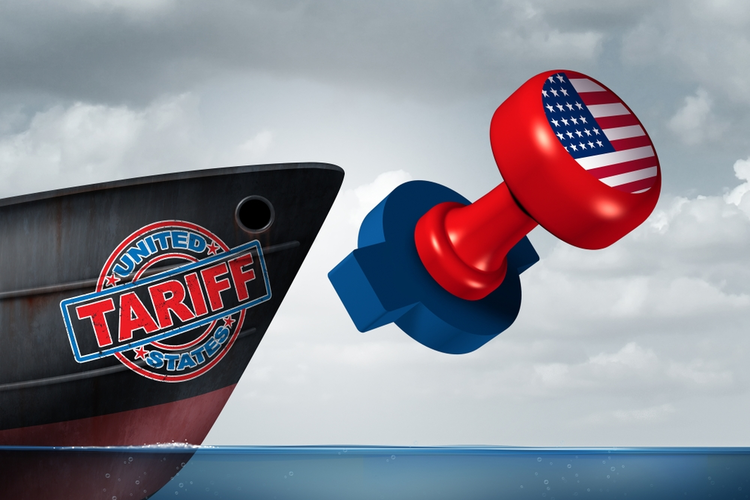Canada-Mexico Trade: Navigating The Challenges Of US Tariff Policy

Table of Contents
Historical Context of Canada-Mexico Trade Relations
Before the North American Free Trade Agreement (NAFTA), trade between Canada and Mexico was relatively limited. The implementation of NAFTA in 1994, and subsequently its replacement by the United States-Mexico-Canada Agreement (USMCA) in 2020, dramatically reshaped the bilateral trade relationship. These agreements significantly reduced tariffs and other trade barriers, fostering substantial economic growth and integration.
- Pre-NAFTA trade volumes: Trade between Canada and Mexico was significantly lower before NAFTA, hampered by high tariffs and bureaucratic hurdles.
- NAFTA's impact on trade diversification: NAFTA encouraged diversification of trade flows, creating new opportunities for both countries beyond their traditional trading partners.
- Growth of specific sectors: Sectors like automotive manufacturing and agriculture experienced explosive growth due to increased market access and reduced trade costs. The automotive sector, in particular, saw significant integration of production processes across the three NAFTA/USMCA countries.
The Canada-Mexico trade agreement, solidified through NAFTA and then USMCA, forms the bedrock of a robust bilateral relationship, fostering deep economic interdependence.
Impact of US Tariffs on Canada-Mexico Trade Flows
The imposition of US tariffs, particularly under the Trump administration, significantly impacted Canada-Mexico trade flows. These tariffs, often justified on national security grounds, disrupted established supply chains and led to increased costs for businesses.
- Sector-specific impacts: The steel, aluminum, and lumber industries were particularly hard-hit by US tariffs, leading to job losses and reduced production in both Canada and Mexico.
- Trade diversion and its consequences: US tariffs prompted some businesses to seek alternative suppliers outside of North America, diverting trade away from Canada and Mexico and impacting their competitiveness.
- Cost increases and reduced competitiveness: Increased tariffs translated directly into higher prices for consumers and reduced the competitiveness of Canadian and Mexican goods in the US market.
- Examples of retaliatory tariffs imposed: In response to US tariffs, both Canada and Mexico imposed retaliatory tariffs on US goods, escalating trade tensions.
Strategies for Mitigating the Impact of US Tariffs
To mitigate the negative effects of US tariffs, Canada and Mexico must adopt a multi-pronged approach focused on diversification and regional cooperation.
- Exploring new export markets: Diversifying export markets beyond the US, exploring opportunities in Asia, Latin America, and other regions, is crucial to reduce reliance on a single major trading partner.
- Investing in domestic industries: Investing in domestic industries to increase self-sufficiency and reduce dependence on US imports is vital for long-term economic resilience.
- Strengthening supply chain resilience: Building more resilient supply chains that are less vulnerable to disruptions from US tariff policies is essential. This includes diversifying sourcing and manufacturing locations.
- Enhanced collaboration on regional trade initiatives: Strengthening regional trade agreements and fostering closer economic cooperation between Canada and Mexico can create a more stable and integrated trading bloc, reducing vulnerability to external shocks. This includes exploring avenues for deeper integration within the USMCA framework.
The Future of Canada-Mexico Trade in the Shadow of US Policy
The future of Canada-Mexico trade remains uncertain, dependent on the evolving US trade policy. However, proactive strategies can mitigate risks and foster continued growth.
- Potential for future tariff disputes: The possibility of future tariff disputes remains a concern. Open communication and clear dispute resolution mechanisms are necessary to prevent escalation.
- The role of international trade organizations: The World Trade Organization (WTO) plays a vital role in resolving trade disputes and establishing a framework for fair trade. Leveraging the WTO's mechanisms is crucial for addressing unfair trade practices.
- Long-term outlook for Canada-Mexico trade cooperation: Despite challenges, the long-term outlook for Canada-Mexico trade cooperation remains positive. Strengthening bilateral ties and diversifying trade relationships will be key to ensuring continued economic growth.
- The importance of proactive policy adjustments: Both Canada and Mexico must adopt proactive policy adjustments to address the challenges posed by US trade policy. This requires continuous monitoring, analysis, and adaptation.
Conclusion
Canada-Mexico trade faces significant challenges due to fluctuating US tariff policies. However, by diversifying export markets, strengthening regional cooperation, and proactively adjusting policies, both countries can mitigate the negative impacts and secure a prosperous future. Understanding the complexities of Canada-Mexico trade and the impact of US tariffs is essential for businesses and policymakers alike. By actively engaging in strategies to mitigate these challenges and fostering stronger bilateral relations, Canada and Mexico can navigate this turbulent landscape and secure a prosperous future for their economies. Learn more about navigating the challenges of US tariff policy and its effect on Canada-Mexico trade by exploring further resources [link to relevant resources].

Featured Posts
-
 Bollywoods Nora Fatehi Flaunts Stunning Figure In Red Bikini
May 27, 2025
Bollywoods Nora Fatehi Flaunts Stunning Figure In Red Bikini
May 27, 2025 -
 Global Mapping Of Antisemitic Incidents Ajcs New Initiative
May 27, 2025
Global Mapping Of Antisemitic Incidents Ajcs New Initiative
May 27, 2025 -
 Did Selena Gomez Just Expose Taylor Swift The Blake Lively Controversy Explained
May 27, 2025
Did Selena Gomez Just Expose Taylor Swift The Blake Lively Controversy Explained
May 27, 2025 -
 King Charles Iiis Two Birthdays Understanding The Royal Tradition
May 27, 2025
King Charles Iiis Two Birthdays Understanding The Royal Tradition
May 27, 2025 -
 Tracker Season 2 Episode 12 Monster And Episode 13 Neptune Sneak Peeks
May 27, 2025
Tracker Season 2 Episode 12 Monster And Episode 13 Neptune Sneak Peeks
May 27, 2025
Latest Posts
-
 Alexander Gustafsson Jon Jones Isnt Scared But Aware Of Aspinalls Danger
May 30, 2025
Alexander Gustafsson Jon Jones Isnt Scared But Aware Of Aspinalls Danger
May 30, 2025 -
 French Open 2024 Norries Stunning Win Djokovics Comfortable Victory
May 30, 2025
French Open 2024 Norries Stunning Win Djokovics Comfortable Victory
May 30, 2025 -
 French Open Djokovic Cruises Through First Round Andreeva And Gauff Impress
May 30, 2025
French Open Djokovic Cruises Through First Round Andreeva And Gauff Impress
May 30, 2025 -
 Norrie Shocks Medvedev At French Open Djokovic Progresses Easily
May 30, 2025
Norrie Shocks Medvedev At French Open Djokovic Progresses Easily
May 30, 2025 -
 Roland Garros Day 1 Djokovic Triumphs Gauff And Andreeva Secure Wins
May 30, 2025
Roland Garros Day 1 Djokovic Triumphs Gauff And Andreeva Secure Wins
May 30, 2025
